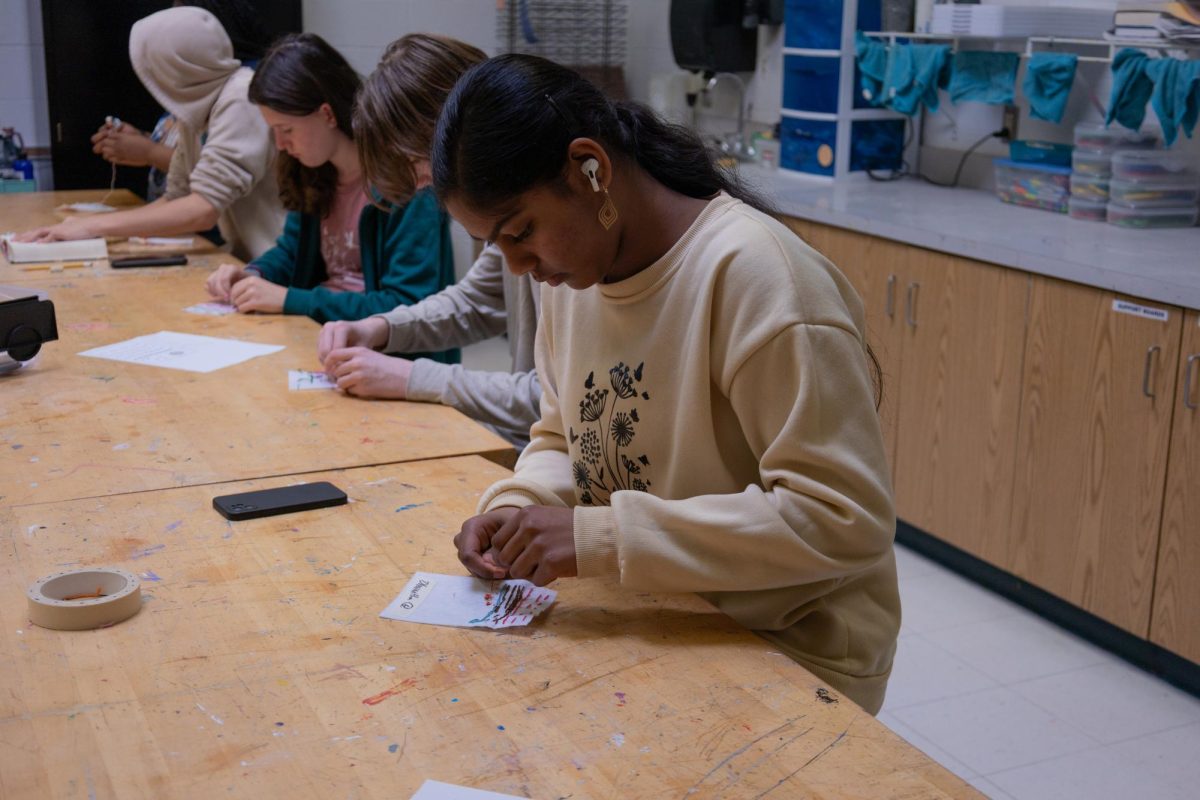Hours spent underneath the lamplight, completing work. Stacks of paper so high it could fuel a bonfire. The sound of frantic scratching as the pencil rushes to finish an assignment that was due two days ago. I haven’t gotten over three hours of sleep in two months, and the influx of work doesn’t end.
This is the image of a student who does not have enough time. As the year progresses, the work has only gotten heavier, and students feel as if they are drowning in work. Schedules are stacked with extracurriculars and no time to do them.
The problem is that in a school system where colleges prioritize extracurriculars, many teachers and schools don’t allocate for this when assigning work. They assume a 30-minute assignment is manageable, but when you multiply that by seven it ends up being your entire night. Combine that with sports practices, clubs, and even the thought of getting sleep; the days simply aren’t long enough. Students end up sacrificing their mental health, sleep, and social life, all in the pursuit of a good education.
This has been my life recently, as I struggle with managing classes, sports, and rigorous academic clubs, such as speech and debate. Paired with the slowly rising stress of college on the horizon, I often find myself without any free time at all.
Between working on assignments, I juggle practice schedules, meetings, and preparation for competitions. The hours I spend trying to balance it all often leave me staring at a clock, feeling like the minutes slip away faster than I can catch them. I hardly have enough time to sleep, with quizzes and tests being scheduled every week, constantly making up work from days I missed school for debate tournaments.
It’s an avalanche effect. I have to make up my test and miss the notes that day. I can’t do the homework because I missed the notes. I don’t know how to do something on the test because I couldn’t complete the homework, and it cycles over and over.
At the end of the day, I’m left with an overwhelming sense of frustration because, no matter how hard I try, I’m always playing catch-up. Teachers encourage us to be active in school, to perform well, but all we get in the end is more work and shorter deadlines. I can’t even recall the last time I sat down with a book for my leisure or met my friends for a simple hangout.
Across the nation, many students have this same issue. Schools have attempted to allocate this time by shifting their structure to four-day school weeks and block days, but it’s all the same in the end. Free time and social life are not an aspect of culture anymore, but a rarity. I used to look forward to spending time with my friends, whether it was at a store or just sitting on a bench talking about our day. Now, that kind of downtime feels like a distant memory.
In fact, the last time I tried to meet up with friends, I found myself rushing to finish a project that I had no time to start earlier. Social interactions are now increasingly reserved for fleeting moments between assignments.
In a culture that has prioritized work, society sees no benefits from it. Think, just ten years ago, hanging out with friends at the mall was a weekend staple. Now there’s people working on their vacations, a massive lack of work-life balance. When was the last time you saw someone truly take a day off from everything, without the looming pressure of what’s next? With increasing job requirements, having a job as soon as you can is essential. A decrease in college acceptance rates pushes students to complete massive service projects just to be considered.
Students are feeling pressured to join at least four clubs, just to make sure they’re set for the future. 14-year-olds are expected to devote their lives to a cycle of all-nighters and packed schedules in hopes of getting a decent education. I’ve heard peers say they’re afraid of dropping a club because it might hurt their chances of getting into college. I, too, find myself forcing my way through endless hours of homework and project deadlines, knowing that if I falter for even a second, the consequences could be far-reaching.
As the speech and debate season pushes towards a close, I’ve been finding myself staying up late, cramming in work for the next few weeks on the days I know I’ll miss. The exhaustion becomes part of the routine, but it shouldn’t have to be.
Academic achievement has evolved into social deprivation. I find it apparent that the value of my time is directly linked to how much I can produce, how many tasks I can complete, and how I can balance everything. But the cost outweighs the benefit. I haven’t had the energy to see my friends in months. My social life is virtually nonexistent because I’m too busy trying to stay afloat in the sea of assignments, deadlines, and obligations. I feel like I’m being robbed of experiences that are supposed to shape who I am, experiences I can never get back.
What’s the use of working tirelessly to craft a future if I have no time to live in the present? I know what’s at stake — getting into a good college, securing a job, achieving success. But I’m told to live for the future, to give up my time now so that later I can enjoy the rewards. But if I never have time to truly live now, what am I working for? I was told that success is built through sacrifice and that academic excellence and a heavy extracurricular load will get me into the colleges I desire. But with every extra hour I put into school, I lose more of myself. How can I be expected to thrive if I can barely survive?
In the end, students aren’t just asking for less work — they’re asking for a system that understands the importance of balance. We need time to think, to breathe, to relax, and to be human. It’s not about doing more; it’s about doing better. We deserve time to live our lives, not just prepare for them. So when will we as a society realize that education doesn’t have to come at the cost of our well-being? Until that happens, the cycle will continue, and students like me will be left asking: Is this really worth it?










